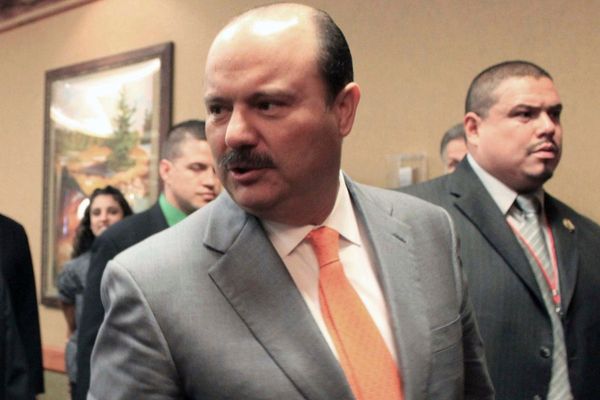A farmer who looks set to lose his farm after taking on his bank over what he says were dodgy lending practices has vowed to keep fighting for accountability in financial services.
It comes amid fears more Australians could find themselves at the mercy of a financial mediation system in need of review.
Ronald Feierabend has been in dispute with Suncorp Bank since he discovered discrepancies in the budget being used to estimate the profitability of his sugar cane farm Wingadee, near Bundaberg, during an application to refinance in 2014.
A series of mediations failed to resolve the dispute, and in 2021 the Supreme Court ruled that Suncorp could appoint receiver managers and sell the farm to recover outstanding costs.
The property will now be auctioned on September 1.
According to prudential regulation expert Andy Schmulow, the outcome was a sign of the failures in a debt mediation system that still favoured the banks.
Mr Schmulow has called for a complete overhaul of the financial dispute resolution process.
'They're circling like vultures'
Throughout his long-running complaint, Mr Feierabend said he had been subjected to extreme pressure exerted by the bank, which he accused of not acting in good faith.
In March, police escorted him off the farm.
"There's been people who have been eyeing off the property, and you know, they think it's going to be a fire sale," Mr Feierabend said.
He alleged the bank withheld essential documents and failed to disclose his right to a free, internal dispute resolution process that would have saved him tens of thousands of dollars and resolved the matter sooner, a claim the bank denies.
"Emotionally, the way I've been attacked, I feel like I've been violated," he said.
"I've seen the farm deteriorate into such a state that the whole farm needs to be refurbished or rebuilt."
A spokesman for Suncorp Bank said due to confidentiality constraints, it would not comment directly on Mr Feierabend's case.
"We are committed to working with and supporting our customers and take our responsibilities as a longstanding Queensland bank, with strong roots in agribusiness, very seriously," he said.
"Suncorp Bank has robust internal processes and resources to ensure our customers are supported, including the option of having an impartial internal review of a complaint."
Twin Peaks regulation fails
Australia's financial regulation system is often referred to as the "twin peaks" model because of the interaction between the Australian Securities and Investment Commission (ASIC), which regulates the conduct of the sector, and the Australian Prudential Regulation Authority (APRA), which is charged with ensuring the stability of the broader financial system.
Dr Schmulow, who is a senior lecturer in the School of Law at the University of Wollongong, said it was a model that had solved many issues in the financial sector but failed to protect consumers.
"The Australian model is of great international interest, but perhaps of more international interest is why has such a good model failed so spectacularly in terms of regulating conduct in the financial industry?" he said.
"How do we know it's failed so spectacularly? Well, because that's the evidence [that] came out of the royal commission."
"The reasons why it has failed are independent of the model itself ... [and] would have caused the same failures had we used any other models for the regulation of the financial industry."
Dr Schmulow cited the broad remit of ASIC, the size, complexity, and in some cases, contradictory nature of the Corporations Act 2001 and timidity in the regulators as reasons the system was still failing after the Royal Commission into Misconduct in the Banking, Superannuation and Financial Services Industry.
Instead, he advocated for a "principles-based, outcome-determined" regime that would allow a customer to argue their case on the basis of fairness.
"In Suncorp's case and their loans to Mr Feierabend, it would have been up to Suncorp to prove they had not acted unfairly," he said.
"From what it sounds like, Suncorp has acted in a manner which is just unconscionable.
"Hopefully, under a principles-based regime, they wouldn't get away with it."
'Bait and switch' code duping consumers
In a statement, Suncorp Bank's spokesman said the bank "ensures we work within all legislative requirements and best practice, including the Banking Code of Practice."
But Dr Schmulow said the voluntary code was a smokescreen, and as more people found themselves in financial distress, it would be shown to be ineffective at changing the behaviour of institutions towards their customers.
"I would actually say that the banking code of practice and its enforcement provisions are something akin to a bait and switch trick," he said.
"It's a deception that is put before the consumer to make the consumer think that they have rights of recourse.
"I can give you an assurance there will be more scandals because the culture in our big banks has not changed."
A spokesman for the Australian Banking Association (ABA), which established the code, said it was enforceable through the Australian Financial Complaints Authority (AFCA) and contract law.
"It clearly sets out the obligations of banks to ensure fair dealings with customers who have a dispute, including obligations by banks to comply with Australian Securities and Investment Commission (ASIC) guidelines in resolving complaints," he said.
Farmer fighting 'to the death'
Mr Feierabend has appealed to ASIC, AFCA, APRA, the ABA, the Australian Competition and Consumer Commission (ACCC) and numerous senators about his treatment from the bank.
AFCA said it could not investigate his claims due to time limits on when they could consider a complaint, while the other agencies determined his complaint to be outside their jurisdiction and referred him back to ASIC.
In a statement, a spokesman for ASIC said reports of misconduct were received in confidence, and so it would not comment on Mr Feierabend's case or confirm if it was investigating.
But Dr Schmulow said the broad scope of ASIC, coupled with a culture that did not aggressively pursue misconduct, meant individuals rarely had a chance to have their complaints investigated.
Mr Feierabend said despite all the setbacks, he had no regrets, and his legal team was continuing to investigate the mediation process.
"This is a matter of right and wrong, and for me, it's a fight to the death now," he said.
"I still believe right to the bottom of my heart that we will come out of this with the truth.
"I know I'm not the only one in this position. I would do it again. I couldn't do it any differently."
As part of the response to the royal commission, the Australian Law Reform Commission is currently reviewing the laws that govern the sector, with a view to simplifying them.
An interim report tabled in parliament in February 2022 identified legislative complexity, overly prescriptive legislation, difficulty with definitions and obscured goals as key problems.
The final report is due in November 2023.







